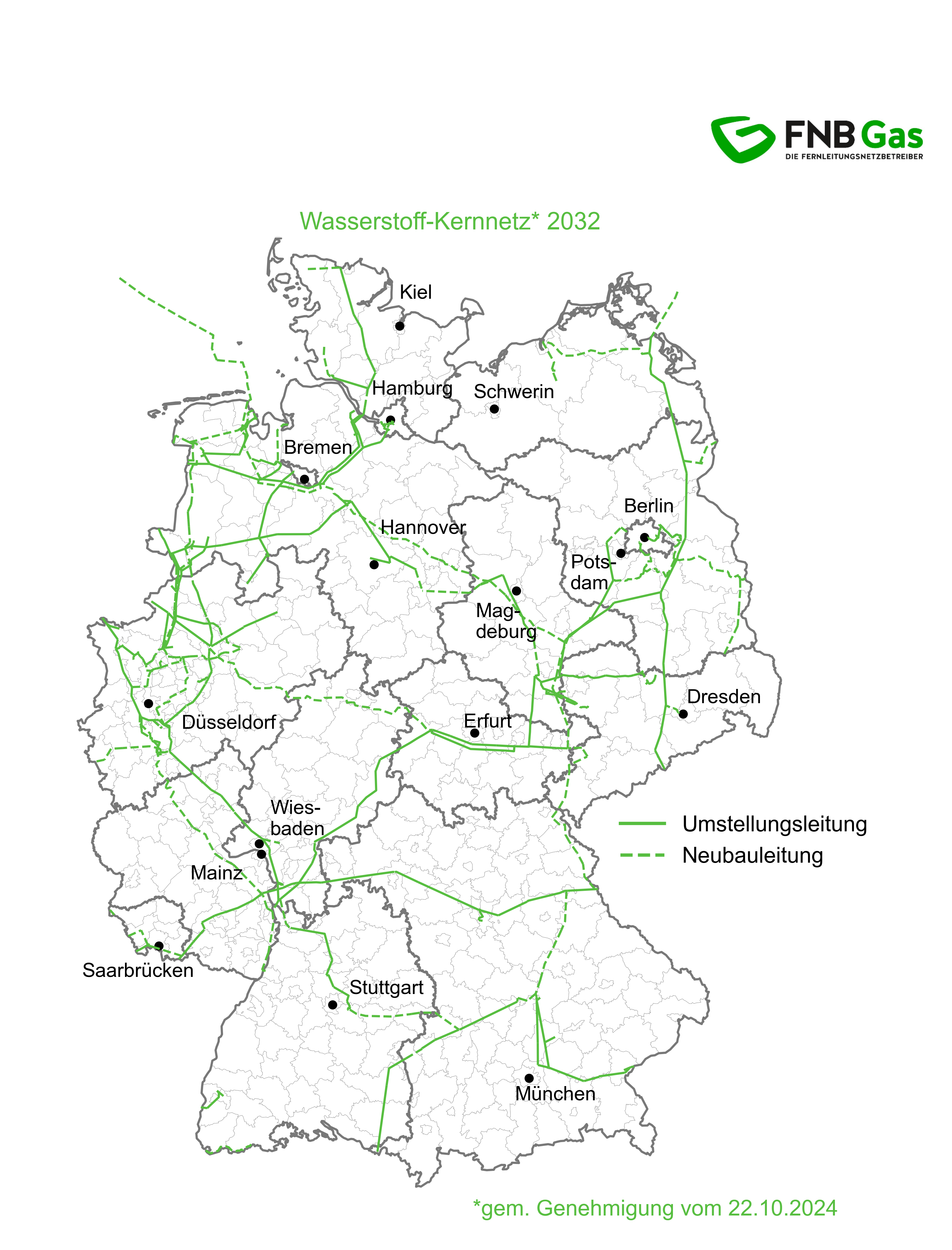Regulatory framework for hydrogen networks
Legal basis and regulatory framework for hydrogen networks
In 2021, the legislator amended the German Energy Industry Act (EnWG) to establish the first national regulatory framework for hydrogen networks. This legal basis for the construction, operation and regulation of hydrogen networks in Germany is expressly intended to serve as a transitional regulation. The German government has been taking a further step since 2023 and wants to create a framework for implementing an initial hydrogen core network as well as an integrated gas and hydrogen network development plan.
German Energy Industry Act (EnWG) 2021
Since 2021 the EnWG has defined hydrogen as a public energy source. The hydrogen network is fundamentally independently regulated and is separate from the natural gas regulation. Cross-funding between natural gas and hydrogen networks is not intended. The legislation states that hydrogen network operators are able to decide whether they wish to be subject to the regulation (opt-in) or prefer to remain unregulated. Regulation involves numerous obligations, such as the creation of a hydrogen network development plan and separate accounting. In return, regulated network operators benefit from, for example, higher returns on equity, which are covered in another regulation (H2-NEV [Hydrogen Network Tariff Regulation]).
The EnWG also includes a duty of cooperation. However, the wording used here is ambiguous and incomplete, and it throws up antitrust issues, which is the reason why, for example, network operators are not able to exchange any information on hydrogen networks within the scope of the network development planning. This and other gaps have resulted in a lack of take-up of the opt-in of this transitional regulation for hydrogen networks in practice.
In addition, the updated EnWG is the first to contain regulations for the conversion of natural gas lines to hydrogen transport as well as for the construction and expansion of hydrogen networks. This also includes extensive permit-related relief where lines are converted from gas to hydrogen.
H2-NEV (Hydrogen Network Tariff Regulation)
The regulation on the costs and charges for access to hydrogen networks and to amend the incentive regulation (“H2-NEV”) entered into force on 1 December 2021. A key element of the regulation is the definition of returns on equity for old and new installations for operators of hydrogen networks. These have been set at 9% for new installations and 7.73% for old installations. Both are valid until the end of 2027, which indicates that the H2-NEV, too, is intended to be a transitional regulation. Overall, the regulation covers a number of important issues and can be considered a starting point for the regulation of hydrogen networks in Germany.
Hydrogen core network
An amendment to the EnWG came into force in December 2023, which contains the first building block of the regulatory, antitrust and network planning basis for the development of a hydrogen core network. The hydrogen core network forms the basic framework of the future hydrogen infrastructure. It will cover the requirements in accordance with the criteria defined in the Energy Industry Act and, in the first stage, will include important supra-regional hydrogen infrastructures that are to go into operation by 2032. The ONTRAS H2 start network of hydrogen is part of the hydrogen core network approved in October 2024.

Approval of the hydrogen core network
The EnWG regulates the criteria for the design of the hydrogen core network, the obligation of the participating grid operators to cooperate and the prompt approval by the Federal Network Agency. Network modelling was coordinated by the transmission system operators. Following the submission of the draft application on 15 November 2023 and the subsequent consultation, the transmission system operators submitted the joint application for the Germany-wide hydrogen core network in July 2024.
On 22 October 2024, the Federal Network Agency (Bundesnetzagentur) approved the hydrogen core network. With an investment volume of approx. 19 billion euros, Europe’s largest hydrogen network will be created by 2032, making it an important pillar of the climate-neutral energy system of the future. Around 60% of the 9,040-kilometer network will be created by converting existing gas pipelines. 40% of the pipelines will be newly built. The core network connects important industrial centers, ports and energy production sites and enables close links with the European neighbors.